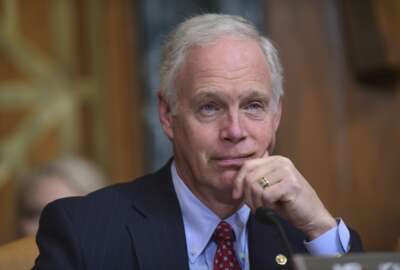
Senate committee clears 2 nominees, but for now leaves MSPB’s future hanging by a thread
The Senate Homeland Security and Governmental Affairs Committee on Wednesday cleared two of the President's nominees to fill the Merit Systems Protection Board....
After months of waiting, the Senate Homeland Security and Governmental Affairs Committee on Wednesday cleared two of the President’s nominees to fill the Merit Systems Protection Board (MSPB) and potentially fill a much-anticipated quorum.
But the committee didn’t make things nearly that simple.
Andrew Maunz, who had sparked some controversy with federal employee unions last year and couldn’t clear a committee vote back in November, withdrew his nomination Tuesday night.
Kirk and Clark’s nominations were easily approved. But committee Chairman Ron Johnson (R-Wis.) said he’d hold the two nominations from the Senate floor until the White House names a third nominee.
“We’ll consider the two other[s], one Democrat and one Republican, and will try and work with the White House and the ranking member to fill the additional nomination as quickly as possible,” Johnson said at Wednesday’s business meeting.
But that puts the White House and the Senate under an even tighter timeline now.
The term for Mark Robbins, the lone member on the board who has been serving in holdover capacity for nearly a year, will expire on Feb. 28. That means the White House and Senate have two weeks to nominate a third person and send all three nominees to the Senate floor for a vote.
That process usually takes weeks, depending on the candidate. If the White House nominates a well-known political appointee who has already been through the appropriate screening and FBI background checks, confirmation could happen quickly, said Bill Wiley, a former MSPB chief counsel and federal employment attorney.
But a nominee who is relatively unknown to government and the administration would take much longer to vet.
Without White House and Senate action by Feb. 28, the MSPB will have no voting members by March. MSPB has been without quorum for more than two years, the longest gap in the agency’s 40-year history. Robbins has been reading and voting on petitions for review on his own since January 2017, but the cases can’t go anywhere without a second, confirmed board member’s opinion.
A member-less board wouldn’t pose too many differences to the federal employees and agencies who have been waiting for a decision on their petitions for review. Some 2,000 cases are currently waiting for a decision from the board.
Some federal employment attorneys, meanwhile, have questioned whether the Trump administration’s inability to staff the board is by design.
But Robbins said after Wednesday’s committee meeting he believes the White House understands the urgency to name a third nominee in the next two weeks. He dismissed the idea that the White House would purposely keep the board vacant to starve the civil service of a well-established point of appeal.
Robbins said the Justice Department had, in conversations with him, once informally raised the question of whether the board’s administrative judges would have the authority to continue to operate under an MSPB with no members, but the issue hasn’t been raised since.
That question, though, is clearly on the mind of Sen. Rand Paul (R-Ky.). He voted “no” to advance the nominees not because he didn’t support them, but because he doesn’t believe in the board in principle.
“[With] something called the Merit Systems Protection Board you think we’d all be for it and it would be a great thing,” he said. “But the problem is that we’ve had it for a long time, and it’s kind of morphed into job protection, not really merit evaluation.”
The committee was poised to vote on legislation that would have extended Robbins’ holdover term for another year. If the committee had cleared that legislation and the two nominees to the Senate floor for consideration, the Senate could have voted to fill a full board.
Johnson, however, opted to table the proposed legislation. And another MSPB term for Robbins, could create further conflicts of interest. He’s serving concurrently as MSPB acting vice chairman and OPM general counsel.
“It’s important for both organizations to move on with some certainty,” Robbins said of the proposal. “If Congress ends up having a position on that option and the White House and the Department of Justice agree with it, I’m open to entertaining it.”
Becca Jones, policy counsel for the Project on Government Oversight, said the House is pushing for a similar bill that would extend Robbins’ holdover term but would prevent him from serving in a second government job at the same time.
Still, MSPB’s future is being closely watched by some in the federal community.
The Senior Executives Association, Partnership for Public Service, National Federation of Federal Employees, Project on Government Oversight and others wrote to committee leaders Tuesday, urging them to take action if the Senate can’t confirm and restore a quorum by March 1.
“In order to ensure that the board can continue operations at the most basic levels, including the critical role in issuing stays in whistleblower cases, passage of legislation to extend the holdover period for the board is imperative,” the organizations wrote. “We strongly urge passage of legislation to prevent the current crisis with the board from doing permanent damage to the merit system and the civil service.”
U.S. Special Counsel Henry Kerner attended Wednesday’s business meeting. For the Office of Special Counsel, not having a functioning and staffed MSPB means OSC couldn’t request formal “stays” of a whistleblower’s personnel action, for example.
“We’re appreciative that the committee has moved two nominees to the floor; that’s terrific,” Kerner said. “But they’ve already announced they’re [not] going to move them until they get a third, so we really need them to move and get a third nominee as soon as possible.”
Copyright © 2024 Federal News Network. All rights reserved. This website is not intended for users located within the European Economic Area.
Nicole Ogrysko is a reporter for Federal News Network focusing on the federal workforce and federal pay and benefits.
Follow @nogryskoWFED
Related Stories





